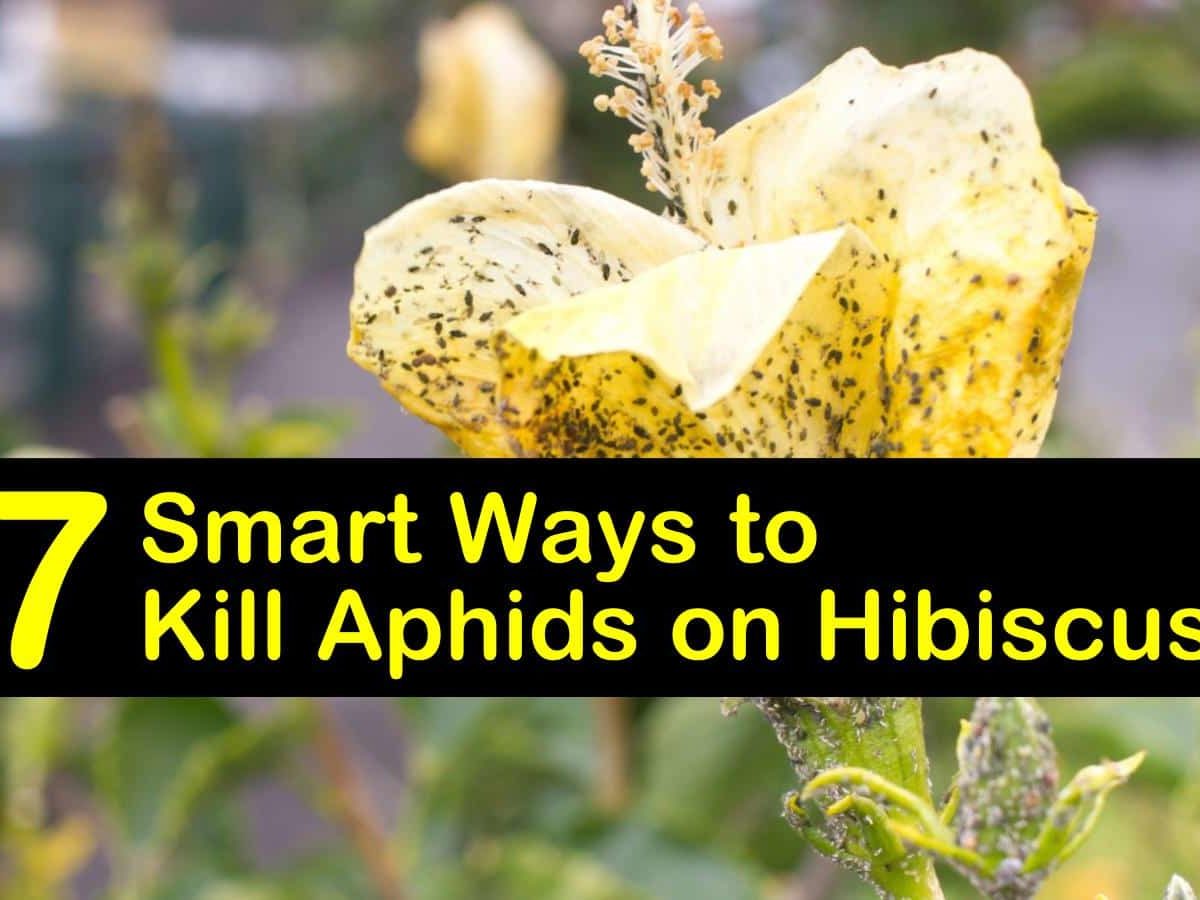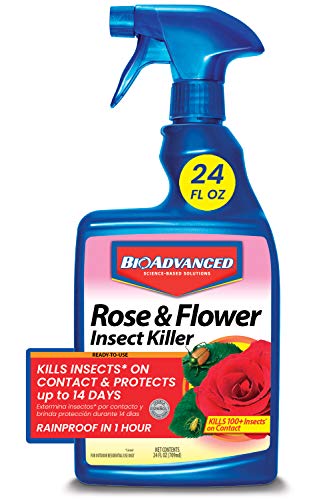Insecticide For Aphids On Hibiscus
When considering whether to apply insecticides for aphid control, remember that most larger plants can tolerate light to moderate levels of aphids with little damage. Larger aphid populations often rapidly decline due to biological control or when hot temperatures arrive. Often a forceful spray of water or water-soap solution, even on large street trees, when applied with appropriate equipment, will provide sufficient control.
If insecticides are needed, insecticidal soaps and oils are the best choices for most situations. Oils may include petroleum-based horticultural oils or plant-derived oils such as neem or canola oil. These products kill primarily by smothering the aphid, so thorough coverage of infested foliage is required. Apply these materials with a high volume of water, usually a 1 to 2% oil solution in water, and target the underside of leaves as well as the top. Soaps, neem oil, and horticultural oil kill only aphids present on the day they are sprayed, so applications may need to be repeated. Although these materials can kill some natural enemies that are present on the plant and hit by the spray, they leave no toxic residue so they don’t kill natural enemies that migrate in after the spray.
These and other insecticides with contact-only activity are generally ineffective in preventing damage from aphids such as the leaf curl plum aphid or the woolly ash aphid, which are protected by galls or distorted foliage. Also, don’t use soaps or oils on water-stressed plants or when the temperature exceeds 90°F. These materials may be phytotoxic to some plants, so check labels and test the materials on a portion of the foliage several days before applying a full treatment.
Supreme- or superior-type oils will kill overwintering eggs of aphids on fruit trees if applied as a delayed-dormant application just as eggs are beginning to hatch in early spring. (On plums dormant applications right after leaves have fallen in early November are preferred.) These treatments won’t give complete control of aphids and probably aren’t justified for aphid control alone but will also control soft scale insects if they are a problem. Common aphid species controlled with these types of oils include the woolly apple aphid, green apple aphid, rosy apple aphid, mealy plum aphid, and black cherry aphid.
Many other insecticides are available to control aphids in the home garden and landscape, including foliar-applied formulations of malathion, permethrin, and acephate (nonfood crops only). While these materials may kill higher numbers of aphids than soaps and oils, their use should be limited, because they also kill the natural enemies that provide long-term control of aphids and other pests, and they are associated with bee kills and environmental problems. Repeated applications of these materials may also result in resistance to the material.
Insecticides such as oils and soaps are also safer to use when children and pets may be present. Formulations combining insecticidal soaps and pyrethrins may provide slightly more knockdown than soaps alone yet have fewer negative impacts on natural enemies than malathion, permethrin, and acephate, because pyrethrins break down very quickly.
Systemic insecticides are also available for aphid management, primarily for woody ornamentals. These materials, including imidacloprid, are very effective and are especially useful for serious infestations of aphids such as the woolly hackberry aphid, which is often not effectively controlled by biological control or less toxic insecticides. Imidacloprid can have negative impacts on predators, parasitoids, and pollinators, so its use should be avoided where soaps and oils will provide adequate control. To protect pollinators, don’t apply imidacloprid or other systemic insecticides to plants in bloom or prior to bloom.
Home-use soil-applied imidacloprid products are often diluted with water in a bucket and poured around the base of the tree or plant. Professional applicators can use soil injectors, which provide better control with less runoff potential. Applications are usually made in spring when aphids first become apparent.
Adequate rain or irrigation is required to move the product through the soil to the roots and up into large trees, and it may take several weeks to see an effect on aphids feeding on leaves. One application on hackberry is enough to control hackberry woolly aphid for two to three years.
Insecticide For Aphids On Hibiscus
Aphids are a type of insect that can be found on plants and trees. They usually live in colonies and feed by sucking the sap out of their host plant. As they feed, they excrete a sugary solution called honeydew. Aphids are typically small in size, with some species ranging from 0.2 to 1 cm long. The coloration of aphids varies from green to gray to black, depending on the species and the host plant they are feeding on.
Insecticides for aphids work by killing or repelling the insects from your plants or trees. This can be done through contact or ingestion—some insecticides will kill aphids on contact while others will only repel them off of your plants or trees.
List Of Insecticide For Aphids On Hibiscus
- INSECT KILLER: Kills 100+ insects including Aphids, Caterpillars, Whiteflies, Japanese Beetles, and more
- KILLS ON CONTACT: Kills listed insects on contact
- 14 DAY PROTECTION: Protects against listed insects for up to 14 days
- USE ON: Roses, flowers, plants, and even vegetable gardens
Additional Info :
| Color | White |
| Item Dimensions | |
| Height | 1 Inches |
| Width | 1 Inches |
| Length | 1 Inches |
| Release Date | 2021-11-11T00:00:01Z |
- 3-in-1 FORMULA: Insect, disease, and mite control for use on roses, flowers, shrubs and trees
- INSECT KILLER: Kills Aphids, Spider Mites, Japanese Beetles, Caterpillars, and more
- DISEASE CONTROL: Fungicide controls Black Spot, Powdery Mildew, and more
- RAINPROOF PROTECTION: Systemic rainproof protection lasts up to 14 days
- COVERAGE AREA: Treats up to 192 roses
- RESTRICTIONS: Not for sale in NY
Additional Info :
| Color | White |
| Item Dimensions | |
| Height | 1 Inches |
| Width | 1 Inches |
| Length | 1 Inches |
| Weight | 2.4 Pounds |
| Release Date | 2021-11-11T00:00:01Z |
- INSECT KILLER: Kills Aphids, Caterpillars, Whiteflies, Japanese Beetles, and more on contact
- 30 DAY PROTECTION: Protects against listed insects for up to 30 days
- USE ON: Roses, flowers, plants, and even houseplants
- RAINPROOF PROTECTION: Rainproof within 1 hour of application
- COVERAGE AREA: Treats up to 34 plants
- RESTRICTIONS: Restricted in CT, MD, & VT. Not for sale, sale into, distribution, and or use in Nassau, Suffolk, Kings and Queens counties of NY
Additional Info :
| Color | Ready-to-Use |
| Item Dimensions | |
| Height | 11.25 Inches |
| Width | 2.19 Inches |
| Length | 5 Inches |
| Weight | 0.00024 Pounds |
- Insect killer: kills aphids, mealybugs, mites, white flies, and more
- Fast acting: kills listed insects in minutes and is effective against adult, larvae, and nymph stages of pests
- Easy to use: ready-to-use bottle makes application easy
- Use on: for indoor or outdoor use on roses, flowers, fruits, vegetables, and even houseplants
- For use on vegetables, flowers, fruits and houseplants
Additional Info :
| Color | Ready-to-Use |
| Item Dimensions | |
| Height | 10.5 Inches |
| Width | 4.8 Inches |
| Length | 2.3 Inches |
| Weight | 1.5 Pounds |
| Release Date | 2011-05-23T00:00:01Z |
- Fast-Acting Formulation – Kills insects within minutes after contact
- No Visible Residues – Clean formula won’t leave a residue on plant leaves and vegetables
- Kills All Life Stages – For control of foliage feeding worms (caterpillars), aphids, ants, beetles, thrips, mites, & other listed pests
- With Spinosad – Ready to use insecticidal soap formula uses spinosad for added power
- OMRI Listed – Listed with the Organic Mineral Research Institute for organic use
Additional Info :





